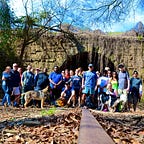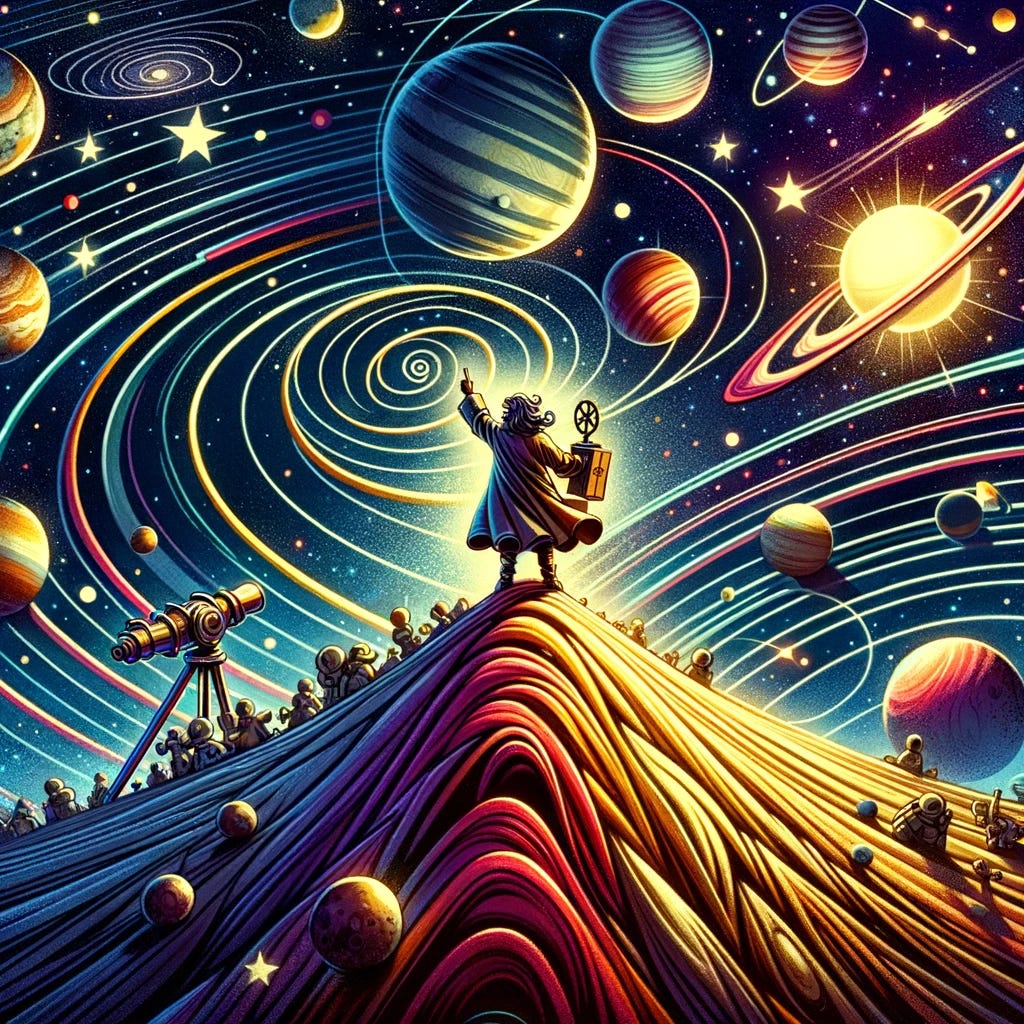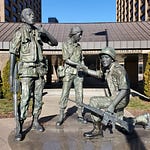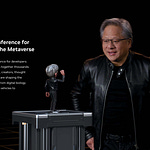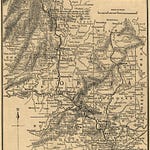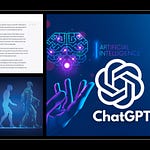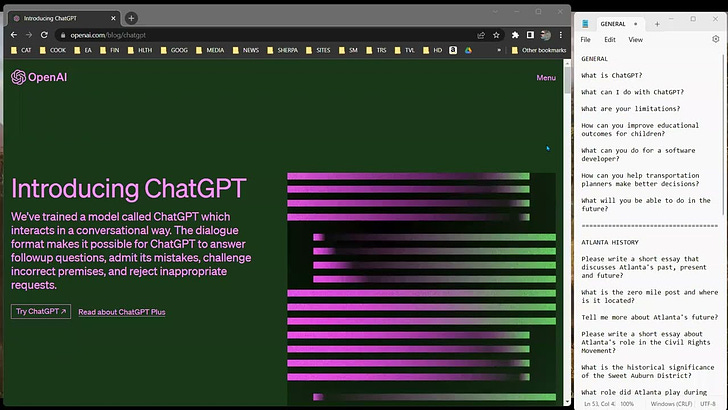This podcast begins under the heading, “About this Podcast.” The audio clip above is an intro piece I recorded later to tee up the podcast. In all, this podcast contains 8 audio recordings (in addition to the intro) totaling ~90 minutes of content. You can access these by clicking on the audio players that are embedded below. In addition, there are ten embedded videos (with explanations) that will help you get up to speed on the AI revolution. Please consider becoming a paid subscriber if you find this podcast useful. Thank you.
Of all discoveries and opinions, none may have exerted a greater effect on the human spirit than the doctrine of Copernicus. The world had scarcely become known as round and complete in itself when it was asked to waive the tremendous privilege of being the center of the universe. Never, perhaps, was a greater demand made on mankind, for by this admission so many things vanished in mist and smoke!
— Johann Goethe —
The father of the “Mother of all Ah-ha’s”
Nicolaus Copernicus (1473–1543) was a Polish mathematician and astronomer who proposed that the sun was stationary in the center of the universe and the earth revolved around it. Up to that point, the consensus “world view” was that the Earth was stationary and at the center of the universe.
Copernicus’s theories were rejected by scholars of his time, and they incensed the Catholic Church. His writings were banned from the church after his death and were not allowed to be read for three centuries. Copernicus spent his final years defending his work and died on May 24, 1543, at the age of 70.
The publication of Copernicus's heliocentric model in his book De Revolutionibus orbium coelestium (On the Revolutions of the Celestial Spheres) was a major event in the history of science, triggering the Copernican Revolution and making a pioneering contribution to the Scientific Revolution.

Have you had a Copernicus Moment?
A Copernicus Moment occurs when you suddenly become aware of something significant that was previously unknown to you. One can also occur when you learn that something you thought to be true turns out to be false, or vice versa. Copernicus Moments can be personal or societal, in nature. They can, simultaneously, vindicate unpopular views and eradicate erroneous ones. Reactions can vary…
No way!
It’s all hype.
How is this even possible?
I (we) didn’t see this coming.
How could I (we) have been so wrong?
OMG, this changes everything!
If you are unaware or skeptical about Artificial Intelligence, this podcast might trigger a Copernicus Moment for you. Many of the smartest people in the world are saying that this is an inflection point for civilization, as we know it. They are also saying that this technology is advancing much faster than most people realize. The scale of change, and the rate at which it is occurring, increase the probability of getting blindsided. Artificial intelligence will impact every business in every industry. It will also impact every public and private institution in the world. Every man, woman, and child will be affected. The sooner you get up to speed on this technology, the better. — ATLsherpa
About this Podcast
Might be the most important content I have shared in 40 years
Potential impact on every aspect of life and business
Scale of change
Rate of change
Learning tool (crash-course in AI & ChatGPT)
Carefully curated content (avalanche of information)
Approach it like a course
Pace yourself
Content appears in order of “digestability”
You’ll hear directly from people you should listen to (becase they know what they’re talking about)
Sundar Pichai, CEO of Alphabet (Google)
Eric Schmidt, former CEO of Google
Bill Gates, Founder of Microsoft
Creators of ChatGPT (co-founders of OpenAI)
Greg Brockman
Ilya Sutskever
ARK Invest Research Team
Deep Learning: An Artificial Intelligence Revolution, June 2017*
Geoffrey Hinton (godfather of artificial intelligence)
Jensen Huang, CEO of NVIDIA
Safra Catz, CEO of Oracle
Save this podcast
Share this podcast
Take this podcast seroiously!
(*) This is a reasearch paper, not a video. You will find the link at the bottom of the podcast under the heading, Explore More > AI the Opportunity.
AI Buzz
IMPORTANT UPDATE » MAY 23, 2023 — When I published this podcast on May 2 NVDA stock was at $285/share. Today, it closed at $390/share. That’s an increase of 37% in three weeks. PLEASE check with your financial advisor before trading this or any other stock.
UPDATE » FEB. 5, 2024 — NVDA stock closed today at $693/share and is currently trading at $700/share in after-hours trading. Yesterday, BoA raised its price target on NVDA to $800/share.
UPDATE » MAR. 22, 2024 — NVDA stock is trading at $911/share today. Earlier this week, several Wall St firms raised their price target to $1,000/share. The highest is $1,400.
NVIDIA's GPUs have become central to AI for several reasons. First, they can perform many calculations simultaneously, making them much faster than traditional central processing units (CPUs) at handling complex calculations. This allows researchers and developers to train larger and more complex neural networks, which are the foundation of many AI applications.
Second, NVIDIA has developed software libraries and tools specifically for AI and ML tasks, such as the CUDA parallel computing platform, cuDNN deep neural network library, and TensorRT inference optimizer. These tools allow researchers and developers to accelerate their AI workloads on NVIDIA GPUs and get the most out of the hardware.
Finally, NVIDIA has made significant investments in AI research and development, and has worked closely with researchers and industry partners to advance the field. This has helped to drive innovation and create new applications for AI and ML, from autonomous vehicles and robotics to healthcare and finance. Source: ChatGPT—3.5
Inflection point for civilization? You cannot be serious!
iPhone moment for Artificial Intelligence
Jim Cramer sits down with NVIDIA CEO Jensen Huang to discuss the company's move into artificial intelligence, announced today at the GPU Technology Conference.
AI Revolution
We may look on our time as the moment civilization was transformed, as it was by fire, agriculture, and electricity. In 2023, we learned that a machine taught itself how to speak to humans like a peer — which is to say with creativity, truth, error, and lies. The technology known as a chatbot is only one of the recent breakthroughs in artificial intelligence; machines that can teach themselves superhuman skills. CEO Sundar Pichai told us AI will be as good or as evil as human nature allows. The revolution, he says, is coming faster than you know. — Scott Pelley, 60 Minutes (April 2023)
Scott Pelley: Do you think Society is prepared for what's coming?
Sundar Pichai: You know, there are two ways I think about it. On one hand, I would say no (society is not prepared) because there seems to be a mismatch between the pace at which we can think and adapt as societal institutions and the pace at which technology is evolving. On the other hand, I have seen more people worried about AI earlier in its life cycle than with previous technologies, so (in that sense) I feel optimistic. The number of people who have started worrying about the implications is significant, hence the conversations are starting to become serious as well.
Technology that we interact with at the human scale…
Walter Isaacson: You know, industrial, scientific and technological revolutions sometimes sneak up on us. I mean, nobody woke up one morning in 1760 and said, Oh my God the industrial revolution has started, but in the past three or four weeks — between my students and myself — we suddenly feel that we're in a revolution, where artificial intelligence has become personal; it's become chatbots and things that will integrate into our lives. Do you think we're on the cusp of some new revolution?
Eric Schmidt: I do, and this revolution is happening faster than I've ever seen. ChatGPT, which was released a few months ago, now has more than 100 million users. It took G-mail five years to get to the same point. There's something about the diffusion of technology that we interact with at the human scale that's going to change our world in a profound way, much more profound than people think.
Most important advance in technology since the graphical user interface...
Bill Gates: In my lifetime, I’ve seen two demonstrations of technology that struck me as revolutionary.
The first time was in 1980, when I was introduced to a graphical user interface — the forerunner of every modern operating system, including Windows. I sat with the person who had shown me the demo, a brilliant programmer named Charles Simonyi, and we immediately started brainstorming about all the things we could do with such a user-friendly approach to computing. Charles eventually joined Microsoft, Windows became the backbone of Microsoft, and the thinking we did after that demo helped set the company’s agenda for the next 15 years.
The second big surprise came just last year. I’d been meeting with the team from OpenAI since 2016 and was impressed by their steady progress. In mid-2022, I was so excited about their work that I gave them a challenge: train an artificial intelligence to pass an Advanced Placement biology exam. Make it capable of answering questions that it hasn’t been specifically trained for. (I picked AP Bio because the test is more than a simple regurgitation of scientific facts — it asks you to think critically about biology.) If you can do that, I said, then you’ll have made a true breakthrough.
I thought the challenge would keep them busy for two or three years. They finished it in just a few months.
In September, when I met with them again, I watched in awe as they asked GPT, their AI model, 60 multiple-choice questions from the AP Bio exam — and it got 59 of them right. Then it wrote outstanding answers to six open-ended questions from the exam. We had an outside expert score the test, and GPT got a 5 — the highest possible score, and the equivalent to getting an A or A+ in a college-level biology course.
Once it had aced the test, we asked it a non-scientific question: “What do you say to a father with a sick child?” It wrote a thoughtful answer that was probably better than most of us in the room would have given. The whole experience was stunning.
I knew I had just seen the most important advance in technology since the graphical user interface.
— Bill Gates, Gates Notes (March 2023)
How Smart is ChatGPT?
Note the improvement in one year…

CEO Fireside Chat with Jensen Huang and Safra Catz at Oracle CloudWorld
Tune in as CEO Jensen Huang and CEO Safra Catz discuss their multi-year partnership and Oracle Cloud Infrastructure’s major GPU expansion including NVIDIA AI Enterprise software and services. This collaboration will help customers solve business challenges with accelerated computing and #AI and aims to bring the full NVIDIA accelerated computing stack — from GPUs to systems to software — to Oracle Cloud Infrastructure (OCI).
OpenAI Co-founder Greg Brockman on ChatGPT, DALL·E and the Impact of Generative AI
The past year proved that AI is here to stay. We have seen AI disrupt every major industry, from search engines to art and music. The change will be felt in nearly every aspect of our daily lives. In this session (recorded at SXSW2023) OpenAI’s Co-founder and President Greg Brockman talks to Laurie Segall of Dot Dot Dot Media about the future that is here already and the ethical guard rails that come along with this new era of innovation. The conversation will give an insider's look at the research lab behind popular creative tools “DALL·E” and “ChatGPT” and some of the most sophisticated advances in AI. We’ll talk about the future of identity, media and what it means to be human in a world of artificial intelligence.
The Inside Story of ChatGPT’s Astonishing Potential: TED talk by Greg Brockman
In this TED talk from the cutting edge of technology, OpenAI co-founder Greg Brockman explores the underlying design principles of ChatGPT and demos some mind-blowing, unreleased plug-ins for the chatbot that sent shockwaves across the world. After the talk, the head of TED Chris Anderson joins Brockman to dig into the timeline of ChatGPT's development and get Brockman's take on the risks, raised by many in the tech industry and beyond, of releasing such a powerful tool into the world.
Fireside Chat: Jensen Huang: AI Today and Vision of the Future (March 2023)
Ilya, unbelievable. Today is the day after GPT-4. It's great to have you here. I'm delighted to have you, I've known you a long time. The journey and my memory of the time I have known you and the seminal work that you have done — starting at University University of Toronto; the co-invention of AlexNet with Alex and Jeff Hinton that led to the Big Bang of modern artificial intelligence; your career that took you out here to the Bay Area; the founding of OpenAI, GPT123 and then, of course, Chat-GPT, the AI heard around the world. This is the incredible resume of a young computer scientist, that an entire community and industry in awe with all your achievements. I guess I just want to go back to the beginning and ask you about deep learning. What was your intuition around deep learning? Why did you know that it was going to work did you have any intuition that is was going to lead to this kind of success?
Artificial Intelligence: Creating the Assembly Line for Knowledge Workers
From BIG Ideas 2023 by ARK Invest
Generative AI made waves this year, from DALL-E-2 to ChatGPT. These tools are improving the productivity of knowledge workers; ~2x in the case of AI coding assistants.
AI training cost declines continued at an annual rate of 70%, the cost to train a large language model to GPT-3 level performance collapsing from $4.6 million in 2020 to $450,000 in 2022. We expect cost declines to continue at a 70% rate through 2030.
AI should increase the productivity of knowledge workers more than 4-fold by 2030. At 100% adoption, AI could increase global labor productivity by ~$200 trillion, dwarfing the ~$32 trillion in total knowledge worker salaries. Listen in as Frank Downing, ARK Director of Research: Next Generation Internet, and William Summerlin, ARK Analyst & Co-Lead, ARK Venture, explain more.
"Godfather of artificial intelligence" talks impact and potential of AI
Geoffrey Hinton is considered a godfather of artificial intelligence, having championed machine learning decades before it became mainstream. As chatbots like ChatGPT bring his work to widespread attention, we spoke to Hinton about the past, present and future of AI. CBS Saturday Morning's Brook Silva-Braga interviewed him at the Vector Institute in Toronto on March 1, 2023.
Bonus Video
Ahead of this year’s Nvidia GTC developer conference, CNBC sat down with founder and CEO Jensen Huang to talk about ChatGPT, gaming, the omniverse, and what’s next. In this full interview, Huang takes us on the journey of Nvidia, from its early days in a condo to the dominant player in GPUs, gaming, and now A, which is a major focus of GTC this year. Huang also talks about how he handled China export controls, and geopolitical tensions swirling around Taiwan where most of its chips are made. — CNBC, March 2023
Explore More
AI the Disruptor
Disruptive Innovation: Why Now? — ARK Invest, May 2019
The Age of AI has begun — Gates Notes, March 2023
How A.I. could change the future of work — CNBC, April 2023
Chegg could be in big trouble as ChatGPT and A.I. threaten growth, Jefferies says — CNBC, May 2023
‘The Godfather of A.I.’ Leaves Google and Warns of Danger Ahead — New York Times, May 2023
AI the Enabler
Bill Gates says A.I. chatbots will teach kids to read within 18 months: You’ll be ‘stunned by how it helps’ — CNBC, April 2023
Artificial Intelligence is booming – but how will it impact your career? — CNBC, February 2023
How A.I.-powered robots are changing retail — CNBC, April 2023
From making parts with A.I. to digitally cloning cars: What factories will look like in the future — CNBC, April 2023
AI the Opportunity
Deep Learning: An Artificial Intelligence Revolution — ARK Invest, June 2017
Productivity Gains Could Propel The AI Software Market To $14 Trillion By 2030 — ARK Invest, July 2022
Microsoft reports earnings beat, says A.I. will drive revenue growth — CNBC, April 2023
Want to invest in the A.I. boom? Veteran tech fund manager names 4 stocks to own — CNBC, April 2023
How Ark Invest’s Cathie Wood is investing behind the artificial intelligence boom — CNBC, February 2023
Artificial intelligence is a $38 billion revenue opportunity for retailers. Here’s how to play the trend — CNBC, April 2023
Here’s the bear case for artificial intelligence — CNBC, February 2023
AI the Technology
Advancing AI for everyone — Google
Build the future faster with Microsoft AI — Microsoft
AI research and deployment company — OpenAI
NVIDIA CEO Jensen Huang shares the AI technologies affecting every industry–and our everyday lives — NVIDIA, March 2023

